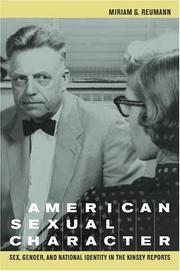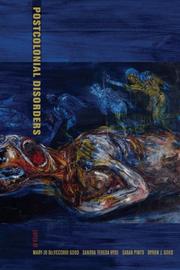| Listing 1 - 3 of 3 |
Sort by
|
Book
ISBN: 9781843843511 184384351X 9781782041108 9781843845249 1782041109 1843845245 Year: 2013 Publisher: Cambridge : D.S. Brewer,
Abstract | Keywords | Export | Availability | Bookmark
 Loading...
Loading...Choose an application
- Reference Manager
- EndNote
- RefWorks (Direct export to RefWorks)
Castration and castrati have always been facets of western culture, from myth and legend to law and theology, from eunuchs guarding harems to the seventeenth and eighteenth-century castrati singers. Metaphoric castration pervades a number of medieval literary genres, particularly the Old French fabliaux - exchanges of power predicated upon the exchange or absence of sexual desire signified by genitalia - but the plain, literal act of castration and its implications are often overlooked. This collection explores this often taboo subject and its implications for cultural mores and custom in Western Europe, seeking to demystify and demythologize castration. Its subjects include archaeological studies of eunuchs; historical accounts of castration in trials of combat; the mutilation of political rivals in medieval Wales; Anglo-Saxon and Frisian legal and literary examples of castration as punishment; castration as comedy in the Old French fabliaux; the prohibition against genital mutilation in hagiography; and early-modern anxieties about punitive castration enacted on the Elizabethan stage. The introduction reflects on these topics in the context of arguably the most well-known victim of castration in the middle ages, Abelard. Larissa Tracy is Associate Professor of Medieval Literature at Longwood University. Contributors: Larissa Tracy, Kathryn Reusch, Shaun Tougher, Jack Collins, Rolf H. Bremmer Jr, Jay Paul Gates, Charlene M. Eska, Mary A. Valante, Anthony Adams, Mary E. Leech, Jed Chandler, Ellen Lorraine Friedrich, Robert L.A. Clark, Karin Sellberg, Lena Wånggren
Literature, Medieval --- Castration in literature. --- Castration. --- Civilization, Medieval. --- History and criticism. --- Civilization, Medieval --- Medieval civilization --- Middle Ages --- Civilization --- Chivalry --- Renaissance --- Emasculation --- Gonadectomy --- Animal contraception --- Male contraception --- Sterilization (Birth control) --- Testis --- Veterinary surgery --- History --- Surgery --- Abelard. --- Archaeology. --- Castrati Singers. --- Cultural Mores. --- Cultural mores. --- Culture. --- Custom. --- Demystify. --- Demythologize. --- Eunuchs. --- Gender Studies. --- Genitalia. --- Harems. --- Law. --- Literal castration. --- Literary Motifs. --- Medieval Castration. --- Metaphoric castration. --- Middle Ages. --- Old French Fabliaux. --- Old French fabliaux. --- Punishment. --- Taboo subject. --- Western Europe. --- Eunuchs --- History.

ISBN: 1282759213 9786612759215 0520930045 1598755188 9780520930049 9781598755183 9780520238350 0520238354 9781282759213 6612759216 Year: 2005 Publisher: Berkeley University of California Press
Abstract | Keywords | Export | Availability | Bookmark
 Loading...
Loading...Choose an application
- Reference Manager
- EndNote
- RefWorks (Direct export to RefWorks)
When Alfred Kinsey's massive studies Sexual Behavior in the Human Male and Sexual Behavior in the Human Female appeared in 1948 and 1953, their detailed data spurred an unprecedented public discussion of the nation's sexual practices and ideologies. As they debated what behaviors were normal or average, abnormal or deviant, Cold War Americans also celebrated and scrutinized the state of their nation, relating apparent changes in sexuality to shifts in its political structure, economy, and people. American Sexual Character employs the studies and the myriad responses they evoked to examine national debates about sexuality, gender, and Americanness after World War II. Focusing on the mutual construction of postwar ideas about national identity and sexual life, this wide-ranging, shrewd, and lively analysis explores the many uses to which these sex surveys were put at a time of extreme anxiety about sexual behavior and its effects on the nation. Looking at real and perceived changes in masculinity, female sexuality, marriage, and homosexuality, Miriam G. Reumann develops the notion of "American sexual character," sexual patterns and attitudes that were understood to be uniquely American and to reflect contemporary transformations in politics, social life, gender roles, and culture. She considers how apparent shifts in sexual behavior shaped the nation's workplaces, homes, and families, and how these might be linked to racial and class differences.
Gender identity --- Sex --- Gender (Sex) --- Human beings --- Human sexuality --- Sex (Gender) --- Sexual behavior --- Sexual practices --- Sexuality --- Sexology --- Kinsey, Alfred C. --- Institute for Sex Research. --- abnormal sexuality. --- alfred kinsey. --- class. --- cold war. --- cultural studies. --- deviant sexuality. --- emasculation. --- female sexuality. --- femininity. --- feminist theory. --- gender roles. --- gender studies. --- gender. --- history. --- homosexuality. --- kinsey report. --- marital sexuality. --- marriage. --- masculinity crisis. --- masculinity. --- national identity. --- nonfiction. --- politics. --- post war america. --- postwar marriage. --- queer theory. --- race. --- sex. --- sexual behavior. --- sexual norms. --- sexual practices. --- sexuality. --- soldiers. --- veterans. --- womens rights. --- womens studies. --- working women.

ISBN: 1435653696 9786611385668 1281385662 0520941020 9780520941021 9781281385666 0520252233 0520252241 9780520252233 9780520252240 9781435653696 6611385665 Year: 2008 Publisher: Berkeley University of California Press
Abstract | Keywords | Export | Availability | Bookmark
 Loading...
Loading...Choose an application
- Reference Manager
- EndNote
- RefWorks (Direct export to RefWorks)
The essays in this volume reflect on the nature of subjectivity in the diverse places where anthropologists work at the beginning of the twenty-first century. Contributors explore everyday modes of social and psychological experience, the constitution of the subject, and forms of subjection that shape the lives of Basque youth, Indonesian artists, members of nongovernmental HIV/AIDS programs in China and the Republic of Congo, psychiatrists and the mentally ill in Morocco and Ireland, and persons who have suffered trauma or been displaced by violence in the Middle East and in South and Southeast Asia. Painting on book jacket by Entang Wiharso
Vulnerable Populations --- Socioeconomic Factors. --- Social Medicine. --- Politics. --- Cross-Cultural Comparison. --- Colonialism. --- Anthropology --- Subjectivity. --- Globalization --- Colonization --- Diseases --- Medical anthropology. --- Subjectivism --- Knowledge, Theory of --- Relativity --- Colonisation --- Imperialism --- Land settlement --- Colonies --- Decolonization --- Emigration and immigration --- Medical care --- Medicine --- Transcultural Studies --- Comparison, Cross-Cultural --- Comparisons, Cross-Cultural --- Cross Cultural Comparison --- Cross-Cultural Comparisons --- Studies, Transcultural --- Study, Transcultural --- Transcultural Study --- Cultural Characteristics --- Culture --- Conservatism --- Decentralization --- Liberalism --- Political Factors --- Voting --- Political Activity --- Activities, Political --- Activity, Political --- Factor, Political --- Factors, Political --- Political Activities --- Political Factor --- Dissent and Disputes --- Medicine, Social --- Public Health --- Factors, Socioeconomic --- High-Income Population --- Land Tenure --- Standard of Living --- Social Inequalities --- Social Inequality --- Factor, Socioeconomic --- High Income Population --- High-Income Populations --- Inequalities, Social --- Inequality, Social --- Living Standard --- Living Standards --- Population, High-Income --- Populations, High-Income --- Socioeconomic Factor --- Tenure, Land --- Economics --- psychology. --- methods. --- Social aspects. --- Anthropological aspects --- aids. --- alterity. --- anthropology. --- asylum. --- balkan territory. --- burma. --- colonialism. --- conspiracy. --- constitution of the subject. --- emasculation. --- gender studies. --- haiti. --- history. --- human rights abuses. --- indonesia. --- infant death. --- infectious disease. --- interpretive politics. --- intervention. --- ireland. --- israel and palestine. --- lombok. --- madness. --- marginality. --- medical anthropology. --- medical. --- migrants. --- political. --- postcolonialism. --- psychiatry. --- republic of congo. --- southwest china. --- spain. --- subjection. --- subjectivity. --- vietnam. --- vietnamese refugees. --- violence.
| Listing 1 - 3 of 3 |
Sort by
|

 Search
Search Feedback
Feedback About UniCat
About UniCat  Help
Help News
News